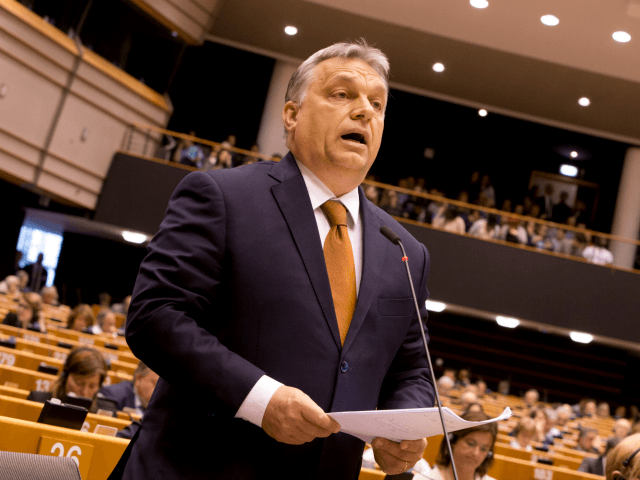In a powerful speech before the European Parliament Wednesday, Hungarian Prime Minister Viktor Orbán urged leaders of the EU to respect Hungary’s sovereignty and to examine its need for serious structural reform.
“You may know that we Hungarians never give up the fight,” Orbán said defiantly, “and I will today once again try to apply the power of common sense in this debate.”
Orbán was referring to specific EU complaints about Hungary’s unilateral opposition to the heavy-handed pressures of American financial speculator George Soros, a major financer of abortion and open immigration throughout the world. Yet in his address, the Prime Minister went further, asserting Hungary’s right to self-governance and challenging the EU to acknowledge the state of crisis into which it has fallen.
He also came to the meeting to showcase the substantial economic progress made by Hungary in recent years, thanks to free market policies of fiscal restraint and pro-business legislation that fly in the face of European bureaucracy, social assistance and hyper-regulation.
“In 2008 we started from a point where Greece was,” Orbán recalled. “The government of Hungary at the time was the first to turn to the Monetary Fund and the EU for a loan. Since then, we have fully repaid this money, ahead of maturity.”
“Since then, we have created hundreds of thousands of jobs. Hungary is on the road to the lowest unemployment rate in the European Union. This is 4% currently. We have created a workfare society, we are giving jobs instead of benefits to everyone who wants to work,” he said.
“Our aim is full employment,” Orbán continued. “Our budget deficit has exceeded the level you required for years – it was 1.8% recently – the state debt is decreasing, and our economic growth is steadily around 4%.”
Acknowledging that Hungary still has “a number of problems to solve,” Orbán said that his nation has reason to be proud. “I am convinced that the success of Hungary is also a European success, and the EU is in great need of success stories nowadays. It would be foolish if this fact did not get enough attention, due to ideological differences,” he said.
While reiterating Hungary’s commitment to the EU, the Prime Minister said bluntly that “we are in many respects dissatisfied with the functioning of the European Union.”
“We are formulating criticism because we want to correct mistakes and we want to reform the European Union. We are convinced that we can only regain the trust of citizens towards European institutions, if we do everything we can to eliminate the causes of bad and inefficient operation.”
While repeating the “basic stance” of the Hungarian government in opposition to the EU’s open borders policy toward economic migrants, Orbán suggested that the EU should allow the Hungarian people the right to control their own borders as well as their fiscal policy.
“Our vision”, he said, “is based on a strong Europe of strong member states. In such a Europe, member states bear responsibility instead of running away from it. Responsibility for state debt, the budget and border protection.”
In an open challenge, the prime minister said that he wanted to influence decisions by using “the tools of debate, reasoning and persuasion,” and called on other EU member states to do the same. Whoever does not like the position of our country, he said, should “contend their own arguments with ours, so we can fight this debate, but please, do not condemn us because Hungary has her own, independent opinion.”
“Hungary is a proud country,” Orbán said. “Hungarians have always considered themselves an important nation, devoted to the Christian values of Europe.”
And while promising Hungary’s commitment to the European Union, Orbán said that his people “will only support the European Union if it is fair and built on open debates, capable of admitting that it needs reform from time to time.”
Follow Thomas D. Williams on Twitter Follow @tdwilliamsrome

COMMENTS
Please let us know if you're having issues with commenting.